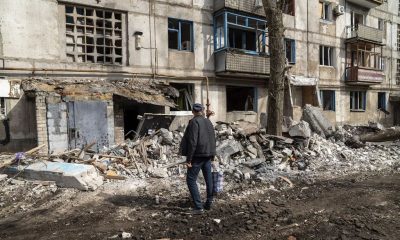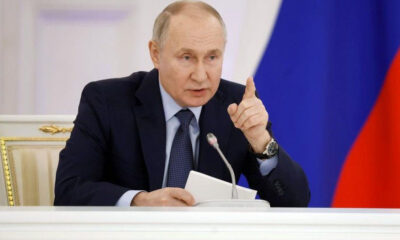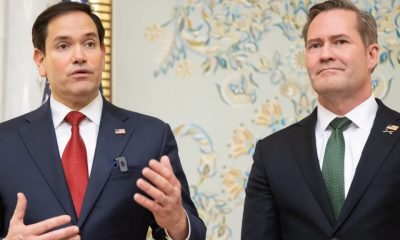International
Volodymyr Zelensky silences Irish parliament all the way from Ukraine

President Volodymyr Zelensky hushed the Irish parliament on Wednesday all the way from Ukraine, on a day when the languages of the two countries intermingled inside and outside the chamber.
The histories of the two countries are intertwined, the Dail heard, as Mr Zelensky spoke to a state marking 100 years since its foundation.
Those sentiments came not from Mr Zelensky himself, but from the politicians who pledged solidarity to the people of Kyiv, Mariupol, Bucha and a host of other war-torn towns.
The Ukrainian leader, when he spoke at 10am on Wednesday, had a different script to the leaders who have previously addressed a joint sitting of the Oireachtas.
He did not, like Tony Blair in 1998, regale politicians with memories of childhood holidays in Co Donegal.
Neither did he share snapshots from career-making moments in Dublin, as European Commission president Jean-Claude Juncker did in 2018.
The only Irish poetry referenced came from Ceann Comhairle Sean O Fearghail, who cited WB Yeats.
Instead, Mr Zelensky asked for help during the first virtual address in the history of the Oireachtas.
What Irish politicians heard was a demand for Irish and European support for the country in the face of Russian aggression.
Gratitude too, but calls to go further.
Mr Zelensky said Ireland has supported Ukraine from the start of the war.
READ ALSO:
- Putin adviser vows legal battles against attempts to seize Russian assets
- Man dies crashing car into Russian embassy in Romanian capital
- Ekiti 2022: Oni escapes assassination as thugs invade SDP secretariat
He said: “You did not doubt starting helping us, you began doing this right away and, although you are a neutral country, you have not remained neutral to the disaster and to the mishaps that Russia has brought to Ukraine.”
The voice of the Ukrainian leader, which has been heard in parliaments all the way from Brussels to Washington, was replaced by that of a translator.
But unmistakable was the impassive face of Mr Zelensky, which loomed above legislators from two screens behind Mr O Fearghail.
Dressed in military green, the Ukrainian president looked on as Irish politicians wore bright hues of blue and yellow.
Lapels, dresses and pocket-squares were all turned into expressions of silent support for Ukraine.
At the entrance to the Dail chamber, Oireachtas staff had also placed two small baskets of yellow and blue flowers.
Looking on too were around 50 ambassadors to Ireland from countries around the globe.
For them hunger is a weapon against us ordinary people as an instrument of domination
Mr Zelensky told those gathered that Russia is using hunger as a weapon in its war against his country.
“This night, our territory was again hit by Russian missiles,” he said.
“They are destroying things that are sustaining livelihoods to people.
“They also have blocked all of our sea ports, together with the vessels that had already agricultural cargos for exports.
“Why are they doing this? Because for them hunger is a weapon against us ordinary people as an instrument of domination.”
The Ukrainian leader stayed just long enough to hear a message of support from Irish premier Micheal Martin, who had sat upright, leaning forward, as he listened intently.
Mr Zelensky must have heard too, from thousands of miles away in Ukraine, the thunderous applause from senators and TDs inside the Dail chamber.
Not all members applauded – four People Before Profit TDs refused to clap, even as other politicians stood for a minute of applause.
The reason, a spokesperson said, was a disagreement with calls from Mr Zelensky for Nato involvement in the war, as well citing demands for more sanctions and a “decision to ban opposition parties” in Ukraine.
“Russia will have to live with the shame of what they have done in Ukraine for generations. Those responsible will be held to account,” Mr Martin told the Dail.
“We are with Ukraine and I am certain that, in the end, Ukraine will prevail.
“We are a militarily neutral country. However, we are not politically neutral in the face of war crimes. Quite the opposite.”
Outside the gates of Leinster House in the Irish capital, a small group of Ukrainian supporters gathered to listen to proceedings.
Irish and Ukrainian schoolchildren from St Joseph’s in the Dublin suburb of Fairview sang the national anthems of the two countries.
Nick Kozlov, from the Ukrainian Crisis Centre, led the crowd in chants.
“I believe, if we have young people like this, Ukraine will never be beaten,” he said.
As the two languages blended together outside, inside Leinster House the histories of the two countries were explicitly linked.
One hundred years after the creation of the Irish Free State, Ireland’s own struggle for independence was invoked, as was 19th century Irish political leader Daniel O’Connell and African-American abolitionist Frederick Douglass.
“In the long history of our own country, we have never invaded another but we do know what it’s like to have been invaded,” Tanaiste Leo Varadkar told the Dail.
“And to have the very existence of our national identity questioned too. For these reasons, we feel for the idealism of the Ukrainian people – their defiance and their determination to face down a new evil empire.”
Unity and silence reigned for most speeches, punctured only by renewed opposition calls for the expulsion of the Russian ambassador – a move resisted so far by the Irish Government.
Sinn Fein leader Mary Lou McDonald, dressed in white, said it is “long past time” to eject Yury Filatov.
That demand was conspicuously clapped by some TDs on the Government benches.
There was levity too.
Senator David Norris, partially kept from the corridors of the Seanad by ill health, made an appearance.
His particularly loud cheers at various stages in proceedings prompted applause and laughter, as well as compliments from Climate Minister Eamon Ryan.
But above all else, there was poignancy.
“Slava Ukraini,” Mr Martin told the embattled Ukrainian leader as he ended his speech.
Only a few metres above him, invisible to the Taoiseach, Ukrainian ambassador to Ireland Larysa Gerasko looked on.
Ms Gerasko, surrounded by colleagues, echoed quietly: “Slava Ukraini.”
INDEPENDENT
International
US releases 41 countries granted 90-day entry without visas (full list)
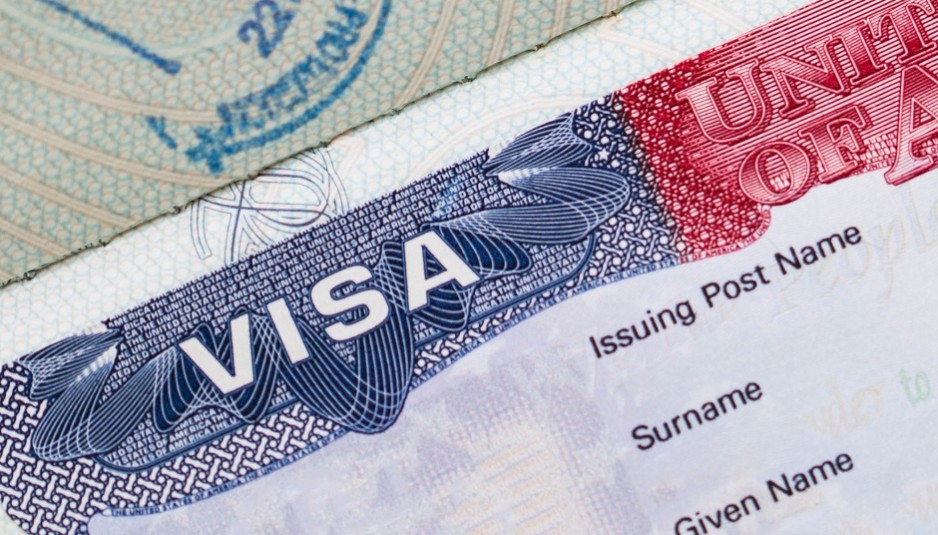
US releases 41 countries granted 90-day entry without visas (full list)
Citizens from 43 countries can now visit the United States for up to 90 days without a visa, thanks to the Visa Waiver Program (VWP).
However, travellers must meet specific requirements and obtain approval through the Electronic System for Travel Authorization (ESTA) before boarding their flight.
ESTA is an online system managed by US Customs and Border Protection that determines eligibility for visa-free travel under the VWP. It’s important to note that the stay must not exceed 90 days, and travelers must apply for ESTA in advance.
The VWP covers travel for tourism or business purposes. Participating countries include the United Kingdom, Australia, France, Germany, Japan, South Korea, and Singapore, among others. Countries like Nigeria and India are not part of the program.
Even if you’re a citizen of a VWP country, you will not qualify for ESTA if:
You have visited or were present in North Korea, Iran, Iraq, Libya, Somalia, Sudan, Syria, or Yemen on or after March 1, 2011.
READ ALSO:
- 2025 UTME: Muslim students kick as JAMB officials seize candidates’ hijab at Caleb Varsity UTME centre
- Pep Guardiola, wife to ‘give marriage a second chance’ after Barcelona reconciliation meeting
- Groom cancels wedding, marries another lady same date, venue
1. You have visited or were present in Cuba on or after January 12, 2021.
2. You hold dual nationality with Cuba, North Korea, Iran, Iraq, Sudan, or Syria.
3. If any of the above applies to you, you must apply for a standard B-1/B-2 visitor visa instead of using the VWP.
1. Andorra
2. Australia
3. Austria
4. Belgium
5. Brunei
6. Chile
7. Croatia
8. Czech Republic
9. Denmark
10. Estonia
11. Finland
12. France
13. Germany
14. Greece
15. Hungary
16. Iceland
17. Ireland
18. Israel
19. Italy
20. Japan
21. Latvia
22. Liechtenstein
23. Lithuania
24. Luxembourg
25. Malta
26. Monaco
27. Netherlands
28. New Zealand
29. Norway
30. Poland
31. Portugal
32. Qatar
33. Republic of Korea (South Korea)
34. Romania
35. San Marino
36. Singapore
37. Slovakia
38. Slovenia
39. Spain
40. Sweden
41. Switzerland
42. Taiwan
43. United Kingdom
US releases 41 countries granted 90-day entry without visas (full list)
International
Thousands pay tributes as Pope Francis’ body lies in state at St. Peter’s Basilica

Thousands pay tributes as Pope Francis’ body lies in state at St. Peter’s Basilica
Vatican City was filled with the sounds of bells and heartfelt chants on Wednesday morning, as thousands of mourners gathered to honor the late Pope Francis.
In a moving and solemn procession, his simple wooden coffin was carried through St. Peter’s Square, marking the beginning of final rites for the beloved pontiff.
The procession began at the Domus Sancta Marta, the residence where Pope Francis passed away, and continued toward St. Peter’s Basilica. There, his body will lie in state until his funeral, scheduled for Saturday.
Two long lines of cardinals and Vatican officials escorted the coffin, while faithful from around the world looked on in prayer and reverence.
Dressed in a red chasuble and a white miter, with a rosary gently wrapped around his fingers, Pope Francis was honored with continuous applause as Swiss Guards solemnly accompanied the casket through the square.
Teresa Piuvano, a New Jersey resident who has been in Rome since March volunteering at Vatican events for the Jubilee year, saw Francis’ appearances on Palm Sunday and Easter Sunday. Easter, she said, “was the most special. I think he wanted to do that to say goodbye to the people because he rode around the whole square even though he was very ill.”
Inside the basilica, the pope was laid on a simple podium instead of the wooden structure, called a catafalque that has traditionally held a pope’s coffin as he lies in state. The ceremony that concluded the procession, led by Cardinal Kevin Farrell, who as camerlengo is charged with overseeing the logistics of the pope’s funeral, referred to Francis in humble terms such as “bishop” and “pastor.”
READ ALSO:
- Rivers: Tinubu set to emergency rule after meeting Fubara
- NNPCL: Protesters storm AGF office, demand probe of Mele Kyari
- Fresh herders’ attack claims 11 lives in Benue
“Dearest brothers and sisters, with great emotion we accompany the mortal remains of our Pope Francis into the Vatican basilica where he often exercised his ministry as the bishop of the church that is in Rome and as pastor of the universal church,” Farrell said in the prayer service.
After the death of Pope Emeritus Benedict XVI, Francis changed the protocol for papal funerals to streamline and simplify the procedures. The pope wanted his own funeral to reflect the life of a pastor and not of a powerful king or politician, he said in interviews.
After the ceremony, cardinals proceeded to bow one by one in front of the coffin before the mourners lined up in the square were admitted.
Nearly 20,000 people visited the basilica yesterday, according to the Vatican, which added that it would ensure that all who wish to pay their final respects to the pope have a chance by staying open after midnight if necessary.
Second General Congregation of Cardinals held in the Vatican
The second General Congregation of Cardinals began yesterday afternoon in the Synod Hall at about 5:00 PM, and ended at 6:30 PM.
According to the Holy See Press Office, 103 cardinals were present. They began the meeting with the ‘Veni, Sancte Spiritus’ prayer, and then with a prayer in suffrage of Pope Francis.
The Cardinals who were not present at Tuesday’s General Congregation were sworn in.
The programme of the Novemdiales, the ancient nine-day period of mourning for the Pope, was approved.
The next General Congregation will be today at 9:00 AM.
At the first General Congregation, held on Tuesday morning, the Cardinals decided to suspend all scheduled beatifications until the new Pope can approve them.
Moreover, in accordance with the norms of Universi Dominici Gregis, a commission of three Cardinals was selected by lot to assist the Camerlengo in the governance of the Church during the sede vacante.
These three Cardinals represent the three orders of the College of Cardinals and are replaced every three days. The first group of three Cardinals chosen was Pietro Parolin (episcopal order), Stanisław Ryłko (presbyteral order), and Fabio Baggio (diaconal order).
The Holy See Press Office noted that around 20,000 people had paid their respects to the late Pope Francis as of 7:30 PM on Wednesday evening.
Why King Charles isn’t allowed at pope’s funeral
Prince William will be traveling to the Vatican to attend the funeral of Pope Francis on behalf of the British royal family later this week. And if you’re wondering why King Charles isn’t going, he literally isn’t allowed.
Royal expert Katie Nicholl writes in Vanity Fair that King Charles “will not travel to the Vatican, in accordance with protocol and precedence which dictates that the Sovereign does not attend funerals, Buckingham Palace has confirmed.” And FYI, this isn’t the first time an heir has attended the funeral of a pope on behalf of the sovereign—back in 2005, then-Prince Charles attended Pope John Paul II’s funeral instead of Queen Elizabeth.
That said, King Charles did visit the pope just a few days before his recent passing, and he released a statement after his death.
Thousands pay tributes as Pope Francis’ body lies in state at St. Peter’s Basilica
International
UK records over 22,000 asylum-seeking Nigerians

UK records over 22,000 asylum-seeking Nigerians
The United Kingdom Home Office received 22,619 asylum petitions from Nigerian nationals between 2010 and 2024.
Nigerians accounted for one in every 30 UK asylum claims over the time, ranking 11th in the Home Office’s recently released year-end asylum and resettlement figures.
According to the Home Office, over two times as many Nigerians (2,841) requested asylum in 2024 than in 2023 (1,462).
Overall, 108,138 people applied for asylum in the UK in 2024, representing a 378 per cent increase from 2010. The majority were first-time claims by South Asian and Middle Eastern nationals.
Iran topped the chart with 75,737, perhaps pushed by the rising persecution of dissidents by the Iranian regime.
Pakistan trailed far behind with 57,621. In 2024, 10,542 Pakistanis sought asylum in the UK, prompted by post-election upheaval, rising inflation, and an increase in blasphemy cases, which human rights groups argue provide strong grounds for protection claims.
Afghanistan has received 54,363 asylum petitions since 2010. In 2024, 8,508 Afghans sought sanctuary in the United Kingdom, a development that experts suggest is a continuation of the Taliban’s ouster of the Karzai administration in 2022.
That year, 11,358 Afghans applied for asylum in the United Kingdom, with 9,710 applications the following year.
Others include Albania (50,944), Iraq (45,711), Eritrea (37,687), Syria (34,997), and Bangladesh (31,744). Asylum seekers from Bangladesh increased from 5,097 in 2023 to 7,225 in 2024. The rise corresponded with the removal of previous Prime Minister Sheikh Hasina.
READ ALSO:
- Driver crushes one-year old boy to death in Ekiti
- Bring your children to compete with mine, MC Oluomo challenges those mocking his spoken English
- Insecurity: Presidency questions push for state police, accuses govs of not doing much
Sudan and India complete the top ten, with 30,897 and 30,179, respectively.
Nigeria’s 22,619 filings are just ahead of Sri Lanka’s 22,059 and surpass Vietnam, China, and Turkey. Brazil, Kuwait, Yemen, Colombia, and Jordan were at the bottom of the list, with each providing fewer than 6,500 claims.
Analysts attribute Nigeria’s rise on the list to tough conditions such as insecurity, bandit assaults, abduction, and a collapse in household purchasing power following the naira’s devaluation in 2023.
In a conversation with our correspondent, Charles Onunaiju, Research Director, Centre for China Studies, Abuja, stated, “We face a difficulty. Nigeria is becoming unfriendly, particularly for young people with limited opportunities, and there is a desperate desire to travel overseas.
According to local reports, young professionals who previously entered the UK on skilled worker visas are increasingly hedging their bets by applying for asylum once there; others arrive irregularly via continental Europe, citing kidnapping threats and communal attacks in their affidavits.
According to the reports, in most cases, petitioners also claim political persecution under Nigeria’s wide cybercrime legislation or discrimination based on sexual orientation—both of which are protected under the Refugee Convention.
According to the Home Office’s website, an asylum seeker must demonstrate a “well-founded fear of persecution” because of their race, religion, nationality, political opinion, or membership in a certain social group.
The Home Office determines the initial decisions, and negative rulings can be challenged in the Immigration and Asylum Chamber.
In theory, the Illegal Migration Act of 2023 makes people who travel through a safe third nation inadmissible.
However, the UK government’s proposed removal process, particularly its contract with former Prime Minister Rishi Sunak to transfer claimants to Rwanda, is still enmeshed in legal obstacles.
As a result, the majority of 2024 and 2025 arrivals will continue to use the existing system.
Dr Aliyu Ilias, an Abuja-based development economist, told The PUNCH that as more Nigerians leave and stay permanently overseas, the country will have less trained labour.
He stated that with most Nigerians confronting both economic headwinds and deteriorating security at home, the British asylum route, however uncertain, still appears to offer a better prospect.
Ilias explained, “It’s definitely a cause of concern because this includes our professionals who are moving, and it takes a whole lot to train these professionals.
“In the medical sector, Nigeria subsidises a lot to get people trained. You cannot get trained as a medical doctor or an engineer abroad for a cheaper cost compared to what we get in Nigeria.
“So, it is total brain drain in the long run, and for the economy, it is reducing our GDP. The appalling part is that most of our Nigerian brothers and sisters who go out do not return. They get permanent residency, and they become valuable to the immediate country.”
UK records over 22,000 asylum-seeking Nigerians
-

 metro1 day ago
metro1 day agoOmokri : How Tinubu’s political mastery started with Abiola, says El-Rufai, Obi’s forces can’t stop him
-

 Education1 day ago
Education1 day agoJAMB officials seize candidates’ hijab at Caleb varsity, Muslim students kick
-

 Entertainment2 days ago
Entertainment2 days agoP-Square: Jude Okoye freed after two months detention
-

 International1 day ago
International1 day agoUS releases 41 countries granted 90-day entry without visas (full list)
-

 Politics2 days ago
Politics2 days agoLabour Party collapses into APC in Plateau
-

 metro1 day ago
metro1 day agoGroom cancels wedding, marries another lady same date, venue
-
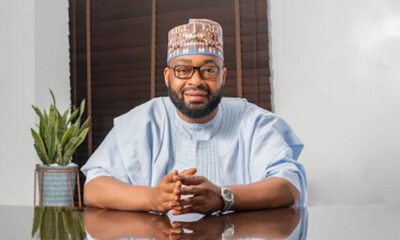
 metro2 days ago
metro2 days agoNiger Gov Bago makes U-turn on dreadlocks ban after backlash
-

 metro9 hours ago
metro9 hours agoEFCC declares four persons wanted over CBEX scam



